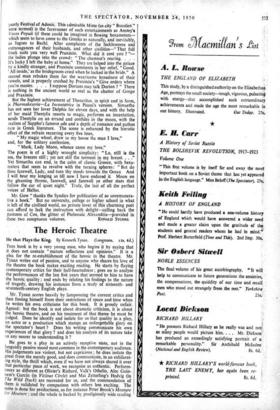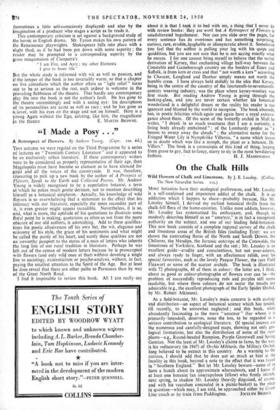The Heroic Theatre
He that Plays the King. By Kenneth Tynan. (Longmans. 128. 6d.) THIS book is by a very young man, who begins it by saying that it does not contain "mature reflections and opinions." It is a plea for the re-establishment of the heroic in the theatre. Mr. Tynan writes out of passion, and to anyone who shares his love of the theatre the book makes exciting reading. He starts by flaying contemporary critics for their half-heartedness ; goes on to analyse the performances of the last five years that seemed to him to have the heroic quality ; and ends by relating his findings to the nature of tragedy, drawing his instances from a study of sixteenth- and seventeeth-century English plays.
Mr. Tynan scores heavily by lampooning the current critics and then freeing himself from their restrictions of space and time when he writes his own criticisms for this book. It is grossly unfair. Agreed : but the book is not about dramatic criticism, it is about the heroic theatre, and on his treatment of that theme he must be judged. Does he identify and isolate for us that quality in a play, an actor or a production which stamps an unforgettable glory on the spectator's heart ? Does his writing communicate his own experiences of that glory ? and does his analysis of its nature take us any nearer to understanding it ?
He goes to a play in an actively receptive state, not in the languidly passive mood most common in the contemporary audience. His judgements are violent, but not capricious ; he does isolate the great from the merely good, and does communicate, in an exhilarat- ing style, the thrill which, even if we have not always shared it over that particular piece of work, we recognise as authentic. Perform- ances as different as Olivier's Richard, Valk's Othello, Alec Guin- ness's Garcin (in Vicious Circle) and Mai Zetterling's Hedvig (in The Wild Duck) are recreated for us, and the commendation of them is validated by comparison with others less exciting. The same is done for productions, as for instance Peter Brook's Measure for Measure ; and the whole is backed by prodigiously wide reading
(sometimes a little self-consciously displayed) and also by the imagination of a producer_who stages a script as he reads it. This contemporary criticism is set against a background study of the heroic in English drama. Mr. Tynan makes his own pattern of the Renaissance playwrights. Shakespeare falls into place with a slight thud, as if he had been put down with some asperity ; the reader may be prompted to a corresponding asperity by the gross misquotation of Cleopatra's "I am Fire, and Ayre ; my other Elements I give to baser life." But the whole study is informed with wit as well as passion, and if the temper of the book is too invariably warm, so that a chapter on five comedians which the author offers as "light relief" turns opt to be as serious as the rest, such ardour is .welcome in the prevailing flabbiness of the theatre. That hardly any contemporary play fits into the book is not the author's fault. He has gone to the theatre unremittingly and with a seeing eye: his descriptions of its personalities are acute as well as racy ; and he has gone as 'ailover, with his eyes on the stage and not on himself. Here is a young Agate without the Ego, sainting, like him, the magnificent















































































 Previous page
Previous page